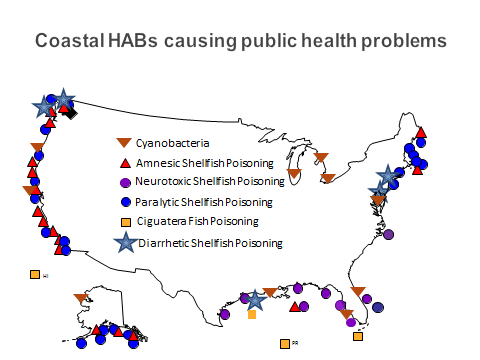Harmful algal blooms (HABs) are projected to increase as sea surface temperatures rise and ocean acidification continues according to Dr. Alan Lewitus, of NOAA's National Centers for Coastal Ocean Science. His findings were shared during a symposium at George Mason University in October which covered such topics as climate change and extreme weather effects on agriculture and biodiversity.
Dr. Lewitus presented an overview of the known and predicted impacts of climate change on HABs at aspecial sessionof the symposium on marine and coastal resources. Lewitus focused on five HAB organisms that are highly problematic in the U.S., addressing their human disease syndromes and the climate change factors likely to influence their bloom properties, including toxicity.
One conclusion is that the global spread of HABs is generally attributed to increasing nutrient availability (i.e.,eutrophication) but climate change may also play a role. The strongest hypotheses for projected increases in HABs are related to 1) increasing sea surface temperatures broadening the seasonal bloom window of opportunity (e.g.,Alexandrium), expanding distributions (e.g.,Gambierdiscus) and providing competitive edges for growth (e.g.,cyanobacteria/blue-green algae); and 2) increasing concentrations of dissolved carbon dioxide (i.e., ocean acidification) promoting growth of tested species ofAlexandrium,Pseudo-nitzschia,Karenia brevis, and toxicityof A. catenellaandPseudo-nitzschia.
Forecasting the effects of climate change on HABs is complex and will require a holistic ecosystem modeling approach to be successful. The latest findings involving the impacts of climate change on HABs will be presented at the 'Scientific Symposium on Harmful Algal Blooms and Climate Change" in Gothenburg, Sweden May 19 -22, 2015.
For more information, contact Alan.Lewitus@noaa.gov.
 Official websites use .gov
A .gov website belongs to an official government organization in the United States.
Official websites use .gov
A .gov website belongs to an official government organization in the United States. Secure .gov websites use HTTPS
A lock or https:// means you’ve safely connected to the .gov website. Share sensitive information only on official, secure websites.
Secure .gov websites use HTTPS
A lock or https:// means you’ve safely connected to the .gov website. Share sensitive information only on official, secure websites.